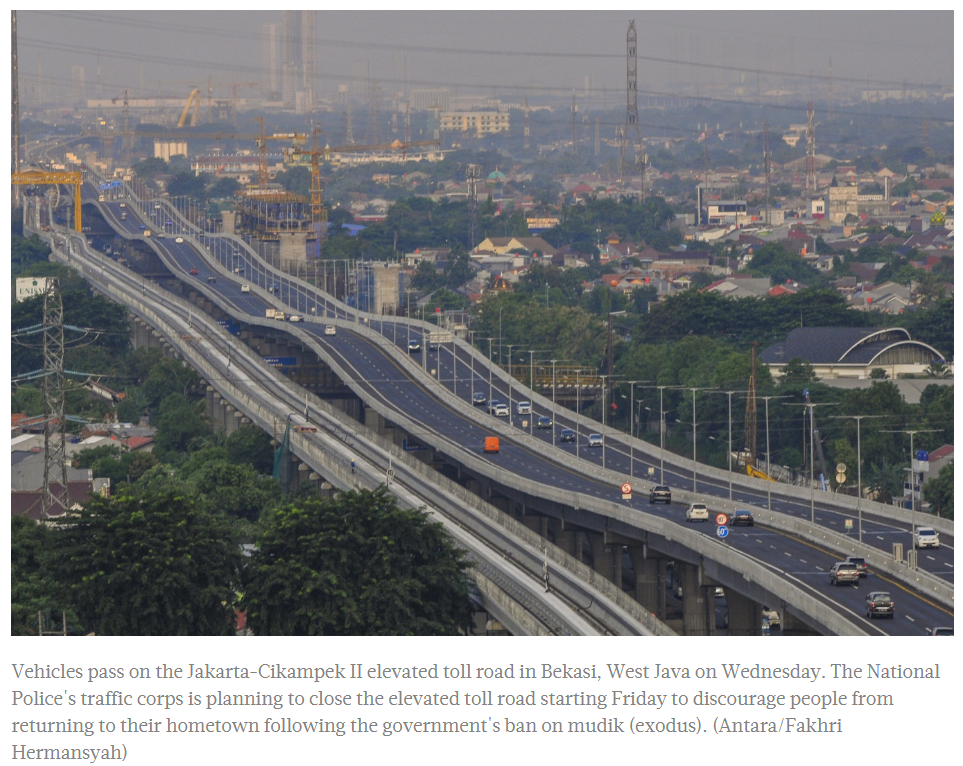Loose social distancing rules point to slow Indonesian recovery
Indonesia opted for less punishing social-distancing measures than its neighbors to stem the spread of the coronavirus. Now analysts are warning its economy will take much longer to recover than others in Southeast Asia.
With the peak of the pandemic expected in late May, President Joko Widodo is recalibrating his strategy of large-scale social distancing rules and calling for a ramp-up of testing to contain the impact of the virus that’s been the deadliest in Asia after China and India. While more cities are opting for partial lockdowns, more than two-thirds of the country’s 270 million population remain only under voluntary isolation, fanning infections now to more than 260 cities across the archipelago.
The president’s approach to the crisis stands in sharp contrast to the nationwide lockdowns in countries like India and Malaysia, which are now set to relax some curbs. Indonesian officials estimate the disease will infect about 95,000 people before easing. Jokowi, as Widodo is known, may need to add to the $28 billion in stimulus to fight the economic shock from the pandemic.
“The Indonesian government’s response to Covid-19 has been slow, unclear and fractured,” Fitch Solutions said in a report. “Given the late containment efforts in Indonesia, we believe that the Covid-19 outbreak will likely last longer compared to other countries in the region. As such, containment measures and border closures will also remain in place for longer.”
Jokowi has rejected calls for a complete lockdown, citing the impact on jobs and businesses. But he’s pushing for stricter social distancing and this week banned an annual ritual of millions of Muslims traveling to hometowns and villages ahead of the Eid al-Fitr festival. He held back on the ban until the government rolled out billions of dollars in food and social assistance programs to shield millions left jobless.
Jokowi has denied charges of being slow to respond to the pandemic, saying his administration had started preparing for it as early as January but was hamstrung by “brutal competition” among nations to secure the supply of test kits and other medical equipment.
Testing failure
A failure to conduct mass testing in the early period of the outbreak means there may be as many as 60,000 people needing treatment by the end of May, according to Pandu Riono, an epidemiologist at the University of Indonesia. The virus has infected almost 7,800 people and killed 647 even with the enforcement of some social distancing rules for more than a month.
“Our estimate right now is that 86% of the infections out there are asymptomatic,” Riono said, adding the government can contain the number of people needing medical attention to about 12,000 at its peak by adopting stricter social distancing policy nationally.
But concerns are mounting about the cost of protecting the economy. While countries like South Korea and Taiwan have been successful in reining in the pandemic with least disruptions to mobility, others like Japan and Singapore have tightened social distancing rules after shunning strict measures initially.
Singapore — a country experienced in handling epidemics — showed it’s possible to be wrong-footed by the coronavirus. It’s now home to Southeast Asia’s largest recorded outbreak and is racing to regain control, with most new cases centered in the crowded accommodation that’s home to more than 200,000 of the city-state’s foreign workers.
Indonesian authorities extended the partial lockdown in capital Jakarta for another month, saying the measures haven’t been effective enough to slow the virus spread. Governor Anies Baswedan on Wednesday threatened to slap hefty penalties on violators after authorities filed cases against more than 30 companies for failing to comply with work-from-home orders.
The lax enforcement of mobility rules, which bans gatherings of more than five people but allows travel, may point to a longer recovery trajectory for Indonesia, according to Jeffrosenberg Tan, head of investment strategy at PT Sinarmas Sekuritas in Jakarta.
“Looking how things are going under the stricter social distancing measures, there’s a risk that Indonesia may not reach the peak of the outbreak by May. It could be beyond June,” Tan said. “It could potentially prolong the lockdown and that would be very destructive for the economy and businesses conditions.”
Weakening outlook
A prolonged outbreak is weakening the outlook for Southeast Asia’s only $1 trillion economy. The government may need to expand the fiscal stimulus to 1,600 trillion rupiah ($104 billion), or about 10% of gross domestic product, to cushion the economic shock, according to nation’s top business lobby group.
Finance Minister Sri Mulyani Indrawati has warned of a dire outcome of a contraction of 0.4% for the economy under a worst-case scenario. The government has suspended a cap on the budget deficit to give itself the leeway to boost spending. But the budget risks prompted S&P Global Ratings last week to downgrade Indonesia’s outlook to negative from stable.
“While the government and the central bank have made aggressive moves to stimulate the economy, we believe that these efforts will not be enough to offset the devastating effects the Covid-19 pandemic will have on employment and public health in Indonesia,” Fitch Solutions said.
Source: https://www.thejakartapost.com/news/2020/04/24/loose-social-distancing-rules-point-to-slow-indonesian-recovery.html


 Thailand
Thailand




